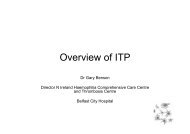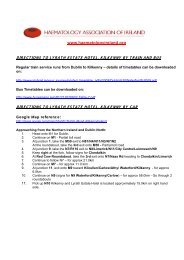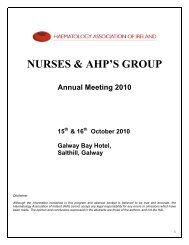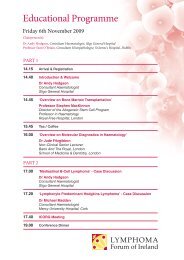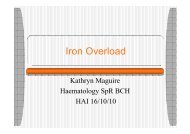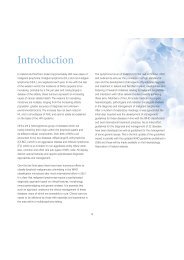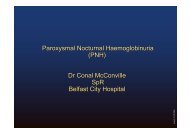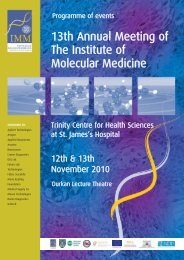Guidelines on Diagnosis and Treatment of Malignant Lymphomas
Guidelines on Diagnosis and Treatment of Malignant Lymphomas
Guidelines on Diagnosis and Treatment of Malignant Lymphomas
Create successful ePaper yourself
Turn your PDF publications into a flip-book with our unique Google optimized e-Paper software.
Recommended Investigati<strong>on</strong>s<br />
Evaluati<strong>on</strong> <strong>of</strong> patients with refractory coeliac disease<br />
Most patients with EATCL have a prior history <strong>of</strong> coeliac disease<br />
or simultaneous diagnosis <strong>of</strong> underlying coeliac disease. There is<br />
currently no recommendati<strong>on</strong> for routine surveillance <strong>of</strong> coeliac<br />
disease patients who have resp<strong>on</strong>ded to a gluten free diet.<br />
Refractory coeliac disease <strong>and</strong> ulcerative jejunitis probably<br />
represent a pre-neoplastic c<strong>on</strong>diti<strong>on</strong> with frequent evoluti<strong>on</strong><br />
to cl<strong>on</strong>al disease <strong>and</strong> associated phenotypic changes. For these<br />
reas<strong>on</strong>s a high level <strong>of</strong> suspici<strong>on</strong> in patients with coeliac disease<br />
with persistent symptoms is necessary. Immunophenotyping<br />
<strong>of</strong> the intraepithelial lymphocytes in serial biopsies in these<br />
patients may be useful in detecting phenotypic change<br />
(evoluti<strong>on</strong> to CD3+, CD8-, CD4- phenotype).<br />
Patients with established diagnosis <strong>of</strong> lymphoma<br />
Investigati<strong>on</strong>s should be carried out as for other high grade<br />
lymphomas. In additi<strong>on</strong>, a small bowel follow through should<br />
be performed, <strong>and</strong> nutriti<strong>on</strong>al status assessed. Cl<strong>on</strong>al T-cell<br />
populati<strong>on</strong>s may be identified in the peripheral blood, but<br />
the clinical significance <strong>of</strong> this is unclear.<br />
<strong>Treatment</strong><br />
St<strong>and</strong>ard treatment with anthracycline c<strong>on</strong>taining combinati<strong>on</strong><br />
chemotherapy is usually used despite poor results. The<br />
Nottingham group have pi<strong>on</strong>eered an approach using IEV<br />
chemotherapy (2 cycles) followed by 2 courses <strong>of</strong> Methotrexate<br />
3gms/m2 for CNS prophylaxis followed by an autologous PBSCT<br />
with survival <strong>of</strong> 4 <strong>of</strong> 6 patients bey<strong>on</strong>d 2 years. Gemctabine<br />
based therapy may be useful in aggressive T-NHLs such as<br />
EATCL. Perforati<strong>on</strong> may occur during initial chemotherapy.<br />
Patients <strong>of</strong>ten require parenteral nutriti<strong>on</strong>.<br />
In patients with refractory coeliac disease or ulcerative jejunitis,<br />
c<strong>on</strong>siderati<strong>on</strong> may be given to pre-emptive treatment with<br />
combinati<strong>on</strong> chemotherapy if phenotypic change in the<br />
intraepithelial lymphocytes or cl<strong>on</strong>ally rearranged T-cells are<br />
detected, but this remains an experimental approach..<br />
Resp<strong>on</strong>se Evaluati<strong>on</strong> <strong>and</strong> Follow Up<br />
Re-evaluati<strong>on</strong> at intervals should include endoscopic evaluati<strong>on</strong>,<br />
small bowel follow through <strong>and</strong> small bowel biopsy.<br />
Prognostic Factors / Index<br />
EATCL has a poor prognosis with a median survival <strong>of</strong><br />
approximately 8 m<strong>on</strong>ths <strong>and</strong> <strong>on</strong>e year failure free survival<br />
<strong>of</strong> less than 20%.<br />
Potential Pitfalls<br />
Failure to recognise the development <strong>of</strong> EATCL in patients<br />
with refractory coeliac disease or ulcerative jejunitis. Frequent<br />
surveillance with endoscopic biopsy <strong>and</strong> immunophenotyping<br />
is recommended in patients with persistent or suspicious<br />
symptoms, <strong>and</strong> in those with refractory coeliac disease or<br />
with ulcerative jejunitis.<br />
48



